
[dropcap]F[/dropcap]lats fishing is a $141 million dollar Bahamian industry that presently has two laws governing it. It is illegal to net bonefish. It is illegal to sell bonefish. Nonetheless, both of these practices continue along with other serious maritime infractions. The government should not institute unneeded and complicated new legislation until the present laws are enforced.
Abaco Fly Fishing Guide Association (AFFGA) is a proponent of a reasonably priced and easily accessible online fishing license for visiting anglers in The Bahamas. Licensing fees could independently fund a self-sustaining warden and enforcement program.
The most important item in this legislation is distribution of fees. If the licensing fees go to the general fund an opportunity to create a much-needed-self-sustaining-independently-funded mechanism to begin effective enforcement of our flats fishing laws could be lost. By funding an enforcement program current laws banning netting and sale of bonefish could be enforced.
We need data regarding actual angler density as opposed to perceived thoughts on angler density. An advisory board could create a comprehensive list of data to be collected when an angler goes online to purchase their fishing license.
After collecting hard data a sustainability study could be commissioned so that a science-based conservation management plan for the flats fisheries throughout The Bahamas may be constructed. Accurate user data would help determine what measures, if any, may need to be instituted to solve user conflicts in various areas throughout The Bahamas.
A Conservation Fund supported by licensing fees should be created and managed by a panel consisting of government, scientists, non-governmental organizations, fisherman and other stakeholders to ensure sustainability. Education of “Best Handling Practices” and other conservation programs and projects designed and implemented by the panel will help keep our pristine Bahamian fishery healthy into the future
The bonefish fishery and associated habitats should be incorporated into evaluations by an appointed commission for proposed coastal and fishing lodge development. Lodge ownership should be dictated by free enterprise, habitat evaluation, and the laws regulating foreign investment in The Bahamas.
Guiding should be reserved for Bahamians. A one-year apprenticeship program with an experienced guide or lodge should be the training mechanism for new guides then they could take a fly fishing certification course offered by the Ministry of Tourism.
Motherships should be banned entirely or a substantial charter fee and licensing fees should be mandated and Bahamian guides should be required on all flats fishing skiffs tendered to motherships.
The AFFGA has worked long and hard over the past six years with the BTT conducting bonefish research and in partnership with Friends of the Environment and the Bahamas National Trust on the formation of three user-friendly National Parks that will encompass the most prolific mangrove nursery areas on Abaco and are presently awaiting governmental implementation.
AFFGA’s mission is protecting Bahamian jobs through sustainable tourism and conservation. The most abundant fishery on earth is only valuable if we can utilize it sustainably and commercially.
The AFFGA does not recognize the BFFIA as a voice in the fly fishing industry. They do not represent us. Not a single one of our members was afforded the opportunity to vote at the annual membership meeting. The actual voting process did not begin until two-and-a-half-hours after the scheduled 4 p.m. adjournment time of the annual general meeting and seconded. Resolutions by members for early voting were not voted upon and ignored by the Chairman and the Directors and the legal council of the BFFIA.
Because of manipulation of the voting process and their exclusionary leadership we want nothing to do with the BFFIA. They don’t even follow their own rules (Articles of Association that govern how the organization is intended to be run.) Why would we let them make rules for the rest of the industry? The BFFIA should have nothing to do with training or certifying guides and absolutely no access to any money collected via fishing licenses because the BFFIA has no credibility as an industry group.
If you agree with the Abaco Fly Fishing Guides Association views, please visit our website www.affga.org for more information and join us ($10) as a supporting member in opposition of the proposed flats fishing legislation and against the BFFIA telling us how guides will operate in the Bahamas.
Cindy Pinder, Vice President & Secretary
Abaco Fly Fishing Guides Association
www.affga.org